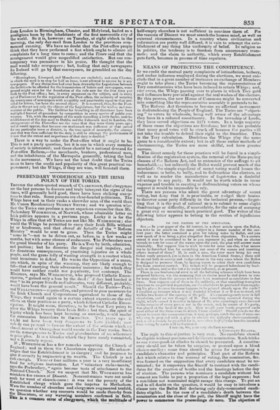PREBENDARY WODEHOUSE AND THE IRISH POLICY OF THE TORIES.
THOUGH the often-quoted remark of CLARENDON, that clergymen are the last persons to discern and truly interpret the signs of the times, will generally hold good, there have been striking exceptions to that rule. Some parsons are clear-headed politicians. The Whigs have not in their ranks a shrewder man of the world than Mr. Canon Residentiary SYDNEY SMITH; and we question whether the Tories can produce a more sagacious counsellor than Mr. Prebendary WODEHOUSE, of Norwich, whose admirable letter on Irish politics appears in a previous page. Lucky it is for the Whigs in office that all Tories are not likeMr. WODEHOUSE; else would the Whigs be permitted to carry their Irish Bills without let or hindrance, and that choral de beadle of the " Reform Ministry" would be sent to grass. Then the Tories might " come in "—not to be driven out, as before, in a few weeks or months, but Si jib some chance of endurance. The Prebendary sees the grand blunder of his party. He is a Tory by birth, education, and position; but he discerns the danger and impolicy, and the disastrous consequences, of practising injustice on a whole people, and the gross folly of wasting strength in a contest which must terminate in defeat. He warns the Opposition of a snare, into which, in spite of the warning, 'they are likely enough to fall—that of carrying their adversaries measures ; for which they would have neither credit nor popularity, but contempt. The Ministers, says Mr. WODEHOUSE, who proposed Catholic Emancipation, " gained only a loss by the deed :" if they had handed it over " to its proper friends and advocates, very different, probably, would have been the general result." Should the Tories—Piste and WELLINGTON—regain office, and proceed to pass measures for the Irish Church and Corporations equivalent to those of the
Whies, they would again to a certain extent experience the evil
effects on their position as a party, which followed Catholic Emancpition. It might seetn, theretitre, to be the best Tory policy to allow the Whigs to carry their Irish Bills : but then, the spirit of ligotry which has been kept burning so unwisely, would render the concession hazardous to themselves. Two years ago it Lioht not have boon very dmeereus to Lave ielded now nob, dy can protend to foresee the estent if the schism which an obaodenment01 Orangoism would create in the Tory ranks. Such are the consequences to Tories and placehunters of an adherence to principles. It is a blunder which they have rarely committed, and ell scarcely repeat. N.'Wonenousa has a few remarks respecting the Church of England ; and in them the Churchman appears. He acknowledges that the Establishment is in danger ; and he proposes to give it security by augmenting its wealth. The Church is not rich enough. Three or four millions a year is a very insufficient fund for religious instruction. Let " voluntary endoetnents:' Says the Prebendary, " again become tests of attachment to the National Church:' Now we suspect that Mr. Wocecouse has mistaken the causes of Dissent. Nonconformists were not made such for want of church-room : it was not the poverty of the Established clergy which gave the impetus to Methodism. Were the number of churches and clergymen augmented tenfold, we Emestion whether any converts would be male thereby from the Dissenters, or any wavering Members confirmed in faith. Thic ilk. a eotumou 01501 of eleritymen, which the ,toultitude of half-empty churches is not sufficient to convince them of. Fot the reasons of Dissent we must search the human mind, as well as external circumstances. In a country where civilization and information are pretty well diffused, it is vain to attempt the establishment of any thing like uniformity of belief. In religion as in politics, the tendency is to freedom from unnecessary trammels; and the claim to authority, which every Establishment puts forth, becomes in process of time repulsive.


























 Previous page
Previous page